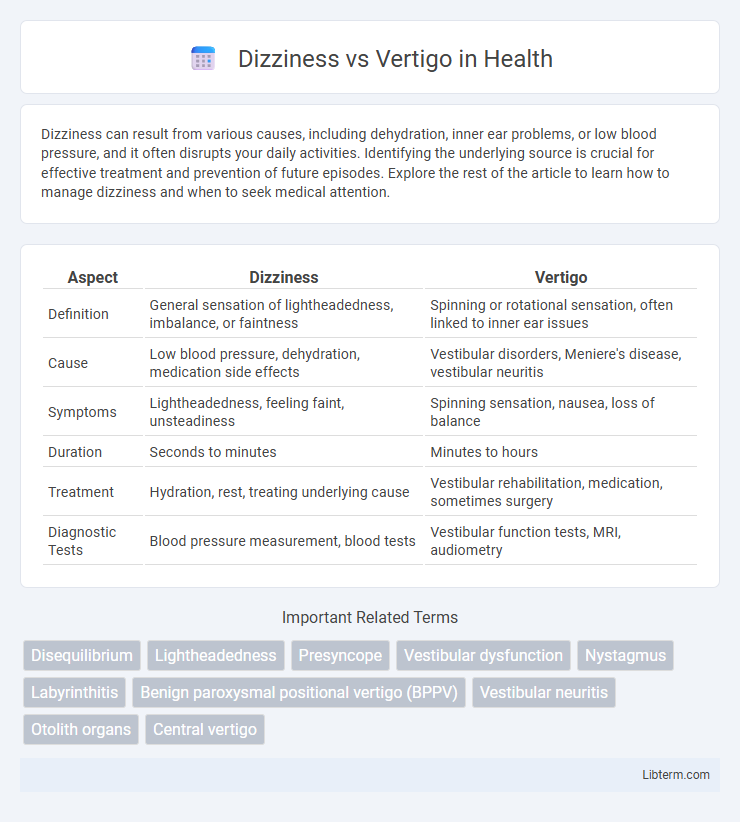Dizziness can result from various causes, including dehydration, inner ear problems, or low blood pressure, and it often disrupts your daily activities. Identifying the underlying source is crucial for effective treatment and prevention of future episodes. Explore the rest of the article to learn how to manage dizziness and when to seek medical attention.
Table of Comparison
| Aspect | Dizziness | Vertigo |
|---|---|---|
| Definition | General sensation of lightheadedness, imbalance, or faintness | Spinning or rotational sensation, often linked to inner ear issues |
| Cause | Low blood pressure, dehydration, medication side effects | Vestibular disorders, Meniere's disease, vestibular neuritis |
| Symptoms | Lightheadedness, feeling faint, unsteadiness | Spinning sensation, nausea, loss of balance |
| Duration | Seconds to minutes | Minutes to hours |
| Treatment | Hydration, rest, treating underlying cause | Vestibular rehabilitation, medication, sometimes surgery |
| Diagnostic Tests | Blood pressure measurement, blood tests | Vestibular function tests, MRI, audiometry |
Understanding Dizziness and Vertigo
Dizziness encompasses a broad range of sensations such as lightheadedness, imbalance, or feeling faint, while vertigo specifically refers to a false sensation of spinning or motion. Understanding dizziness involves identifying its root causes, which can range from dehydration and low blood pressure to vestibular disorders affecting the inner ear. Vertigo is typically linked to disorders like benign paroxysmal positional vertigo (BPPV), Meniere's disease, or vestibular neuritis, highlighting the importance of precise diagnosis for effective treatment.
Key Differences: Dizziness vs Vertigo
Dizziness is a broad term describing sensations of lightheadedness, imbalance, or faintness, whereas vertigo specifically refers to the false sensation of spinning or movement. Dizziness often results from cardiovascular issues, dehydration, or medication side effects, while vertigo typically stems from inner ear problems or vestibular system disorders. Understanding these distinctions is crucial for accurate diagnosis and targeted treatment in clinical practice.
Common Causes of Dizziness
Common causes of dizziness include dehydration, low blood pressure, inner ear infections, and medication side effects, which disrupt balance and spatial orientation. Conditions like anemia, hypoglycemia, and anxiety disorders also frequently result in dizziness by affecting oxygen delivery or nervous system function. Distinguishing dizziness from vertigo is crucial, as vertigo specifically involves a false sensation of spinning, often linked to vestibular system abnormalities.
Common Causes of Vertigo
Vertigo, a specific type of dizziness characterized by the sensation of spinning or movement, is commonly caused by inner ear disorders such as benign paroxysmal positional vertigo (BPPV), vestibular neuritis, and Meniere's disease. Unlike general dizziness, vertigo arises from disruptions in the vestibular system, affecting balance and spatial orientation. Accurate diagnosis and treatment often involve vestibular function tests and targeted therapies to address the underlying causes.
Signs and Symptoms to Recognize
Dizziness presents as a general sensation of lightheadedness, imbalance, or faintness, often accompanied by nausea or blurred vision. Vertigo specifically causes a false sensation of spinning or motion, usually triggered by inner ear problems, and is frequently associated with nystagmus and nausea. Recognizing vertigo involves identifying the distinct spinning feeling and related symptoms, whereas dizziness encompasses a broader range of imbalance sensations without a rotational component.
Diagnostic Approaches for Both Conditions
Diagnostic approaches for dizziness and vertigo involve careful clinical evaluation, including detailed patient history and physical examination to distinguish between these conditions. Vestibular function tests such as the Dix-Hallpike maneuver and head impulse test are crucial for diagnosing vertigo caused by inner ear disorders, while balance assessment and neurological exams help identify non-vestibular dizziness etiologies. Imaging studies like MRI or CT scans can be employed to rule out central causes in persistent or atypical cases of dizziness or vertigo.
Treatment Options for Dizziness
Treatment options for dizziness often include vestibular rehabilitation therapy, medication to address underlying causes such as dehydration or anxiety, and lifestyle modifications like hydration and balance exercises. Identifying and managing contributing factors such as inner ear disorders, cardiovascular issues, or medication side effects is crucial for effective symptom relief. In some cases, maneuvers like the Epley maneuver are recommended if dizziness is related to benign paroxysmal positional vertigo (BPPV), distinguishing it from true vertigo management.
Treatment Strategies for Vertigo
Treatment strategies for vertigo primarily target the underlying cause, such as benign paroxysmal positional vertigo (BPPV), vestibular neuritis, or Meniere's disease. Canalith repositioning maneuvers like the Epley maneuver are effective in resolving BPPV by relocating otoliths within the inner ear. Vestibular rehabilitation therapy improves balance and reduces dizziness symptoms, while medications such as vestibular suppressants and anti-nausea drugs may provide symptomatic relief during acute episodes.
When to Seek Medical Attention
Persistent dizziness lasting more than a few minutes or recurrent episodes should prompt immediate medical evaluation, especially if accompanied by sudden headache, chest pain, difficulty speaking, or weakness. Vertigo that results in severe imbalance, ongoing vomiting, or symptoms following a head injury requires urgent assessment to rule out neurological conditions. Sudden onset of vertigo with hearing loss, double vision, or facial numbness needs prompt diagnosis to prevent potential stroke or inner ear disorders.
Preventive Measures and Lifestyle Tips
Maintaining proper hydration and avoiding sudden head movements significantly reduce the risk of dizziness and vertigo episodes. Ensuring adequate sleep, managing stress through mindfulness or yoga, and limiting caffeine and alcohol intake support inner ear health and balance. Regular physical activity, including vestibular rehabilitation exercises, strengthens balance systems and helps prevent recurrent vertigo symptoms.
Dizziness Infographic

 libterm.com
libterm.com